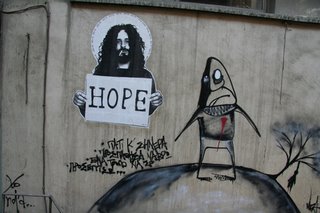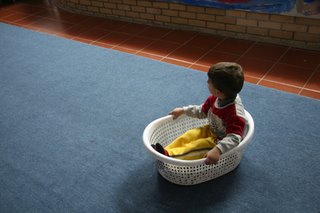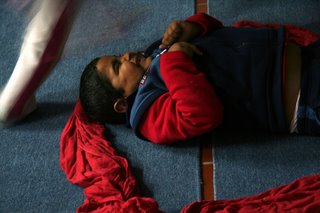Since my arrival, I have been interested in learning about the recent changes taking place in Athens. This is a city known throughout the world for its life 2,000 years ago. However, a lot has changed since antiquity. The life that I see taking place on the streets around me has almost no relationship to the dreams of Greece that I have heard from others. I almost feel bad describing the reality of my life, which can be summed up by saying that I spend long days scrambling along slippery excrement smeared sidewalks trying my best not to get too lost. This can be taken both metaphorically and literally. Of course, I am asking directions as I go, depending almost entirely on the words and stories of others to articulate all that I see moving along the street.
One of the things that has struck me most about Athens is the number of non-Greeks living here, most notably young men who have poured across the boarder into the promise of Europe. The vast majority of these migrants are from Albania and other former Soviet Block states. However, there are also tens of thousands of Southern Asians and Africans who are making Athens their home. Speaking with Africans who I meet on the street, in shops and through networks I have been impressed and moved by their stories, and personal courage. I have decided to make a project of collecting some of these stories in a series of formal and informal interviews, and when possible, portraits. The following is an excerpt of a profile that I am working currently working on.
“Greeks they are lazy people. They eat all the time. I watch it. They will sit in a café for hours talking bita bita bita bita, and then they will just move next door and begin to eat. They will stay there for more hours. It makes me sad, because their children see this behavior and they learn it. I will never let my children be lazy. They must learn to work, they must study. If I see that they are lazy, I will disown them. You cannot be my child and be lazy. You cannot! And my wife too. She cannot be lazy. This is the most important thing.” –B
B works selling bootleg CDs and DVDs seven days a week in a historic area of the city frequented by tourists and young people. On good days, he can make more than 80 Euros, but some days he only makes five or ten. He has been working in the same area and saving for more than two years, although during the winter, he works shorter days. If the weather is bad, be does not go out at all, preferring to stay in bed watching CNN and praying. He says that some people believe in people, and that some people believe in God. He prefers God because God has really worked for him in the past.
B paid 6,000 American dollars to come to Europe, but did not intend to stop in Greece. He regrets not having gone all the way to Holland, as was originally planned. Traveling was so exhausting, however, that he decided to stop in the first European city he came to. It happened to be Athens. B never intended to stay in Europe. When he left Nigeria, he told his friends and family that he would be gone for three years and return with money. He plans on leaving in ten months, which will make his return to Nigeria exactly three years and three months after his initial departure. He will return with enough money to start his own business selling mobile phones that he will import from China.
As we were eating, B received a call. When he hung up, he was smiling.
“Who was that?” I asked.
“Ah, it was nobody.”
“Then why are you smiling like that? You look very happy.”
“I look happy? I don’t know.”
“Yes, I think you know. Was it a woman?”
“Do I really look happy like that? Yes. Ok, yes, it was a woman.”
“Who?”
“A certain German woman, but I don’t like her.”
“You don’t? Then why are you smiling like this?”
“I don’t think I’m smiling. You know, this woman she really likes me, but I don’t like her. She is always calling me, asking me to come to her place, but I won’t go. I don’t know why, but I don’t like her.”
“Where did you meet?”
“She wanted to do business with me, but she also wants something more. She even offered to pay my rent, but I said no. I am smiling because I was lying to her. I told her that I am not in Athens. I said to her that I am in Patras, and she called to see if I had arrived safely. She doesn’t know that really I am here.”
“Why don’t you like her?”
“I don’t know. Sometimes you don’t like someone and you don’t know why. I can’t tell, but I just don’t like this lady. I really need to tell her that she can’t be calling me like this.”
“Did you let her pay for your rent?”
“No! Of course not! If I liked her, then I would let her pay, but I don’t like her, and to take her money would be wrong. My conscience wouldn’t allow it.”
“How long have you known her?”
“She has been calling me for three weeks now. I don’t know why I didn’t tell her these things before, but I think that now I must. I will say: if you want to do business, fine, but I can’t do more than that with you. And if she goes away, that is her choice. I can’t say anything.”
“Why did she first come to you?”
“I’m not sure. You know, the woman here, they love my hair. They just walk by and call to me like that. They say, “…” Do you know what that means? It means, “Nice hair” in Greek. People are always saying that to me, and even some of the Greeks try to make their hair like mine, but they can’t. On me it is natural. In Africa, this hair means that you are a crazy guy. It means that you are not a good guy. But here it is not the same. It is just a style. It doesn’t mean anything.”
“What will you do when you go back to Nigeria? Will you cut your hair?”
Laughing, “My mother, she will be worrying me. She will say, ‘Ah, you are not a foolish guy? Why this hair?’ She will be very angry, but I will keep it. The people there, they know me, and they trust me, so they can’t mind my hair. I don’t know why people in Nigeria don’t like this Rasta hair.”
One of the things that has struck me most about Athens is the number of non-Greeks living here, most notably young men who have poured across the boarder into the promise of Europe. The vast majority of these migrants are from Albania and other former Soviet Block states. However, there are also tens of thousands of Southern Asians and Africans who are making Athens their home. Speaking with Africans who I meet on the street, in shops and through networks I have been impressed and moved by their stories, and personal courage. I have decided to make a project of collecting some of these stories in a series of formal and informal interviews, and when possible, portraits. The following is an excerpt of a profile that I am working currently working on.
“Greeks they are lazy people. They eat all the time. I watch it. They will sit in a café for hours talking bita bita bita bita, and then they will just move next door and begin to eat. They will stay there for more hours. It makes me sad, because their children see this behavior and they learn it. I will never let my children be lazy. They must learn to work, they must study. If I see that they are lazy, I will disown them. You cannot be my child and be lazy. You cannot! And my wife too. She cannot be lazy. This is the most important thing.” –B
B works selling bootleg CDs and DVDs seven days a week in a historic area of the city frequented by tourists and young people. On good days, he can make more than 80 Euros, but some days he only makes five or ten. He has been working in the same area and saving for more than two years, although during the winter, he works shorter days. If the weather is bad, be does not go out at all, preferring to stay in bed watching CNN and praying. He says that some people believe in people, and that some people believe in God. He prefers God because God has really worked for him in the past.
B paid 6,000 American dollars to come to Europe, but did not intend to stop in Greece. He regrets not having gone all the way to Holland, as was originally planned. Traveling was so exhausting, however, that he decided to stop in the first European city he came to. It happened to be Athens. B never intended to stay in Europe. When he left Nigeria, he told his friends and family that he would be gone for three years and return with money. He plans on leaving in ten months, which will make his return to Nigeria exactly three years and three months after his initial departure. He will return with enough money to start his own business selling mobile phones that he will import from China.
As we were eating, B received a call. When he hung up, he was smiling.
“Who was that?” I asked.
“Ah, it was nobody.”
“Then why are you smiling like that? You look very happy.”
“I look happy? I don’t know.”
“Yes, I think you know. Was it a woman?”
“Do I really look happy like that? Yes. Ok, yes, it was a woman.”
“Who?”
“A certain German woman, but I don’t like her.”
“You don’t? Then why are you smiling like this?”
“I don’t think I’m smiling. You know, this woman she really likes me, but I don’t like her. She is always calling me, asking me to come to her place, but I won’t go. I don’t know why, but I don’t like her.”
“Where did you meet?”
“She wanted to do business with me, but she also wants something more. She even offered to pay my rent, but I said no. I am smiling because I was lying to her. I told her that I am not in Athens. I said to her that I am in Patras, and she called to see if I had arrived safely. She doesn’t know that really I am here.”
“Why don’t you like her?”
“I don’t know. Sometimes you don’t like someone and you don’t know why. I can’t tell, but I just don’t like this lady. I really need to tell her that she can’t be calling me like this.”
“Did you let her pay for your rent?”
“No! Of course not! If I liked her, then I would let her pay, but I don’t like her, and to take her money would be wrong. My conscience wouldn’t allow it.”
“How long have you known her?”
“She has been calling me for three weeks now. I don’t know why I didn’t tell her these things before, but I think that now I must. I will say: if you want to do business, fine, but I can’t do more than that with you. And if she goes away, that is her choice. I can’t say anything.”
“Why did she first come to you?”
“I’m not sure. You know, the woman here, they love my hair. They just walk by and call to me like that. They say, “…” Do you know what that means? It means, “Nice hair” in Greek. People are always saying that to me, and even some of the Greeks try to make their hair like mine, but they can’t. On me it is natural. In Africa, this hair means that you are a crazy guy. It means that you are not a good guy. But here it is not the same. It is just a style. It doesn’t mean anything.”
“What will you do when you go back to Nigeria? Will you cut your hair?”
Laughing, “My mother, she will be worrying me. She will say, ‘Ah, you are not a foolish guy? Why this hair?’ She will be very angry, but I will keep it. The people there, they know me, and they trust me, so they can’t mind my hair. I don’t know why people in Nigeria don’t like this Rasta hair.”




